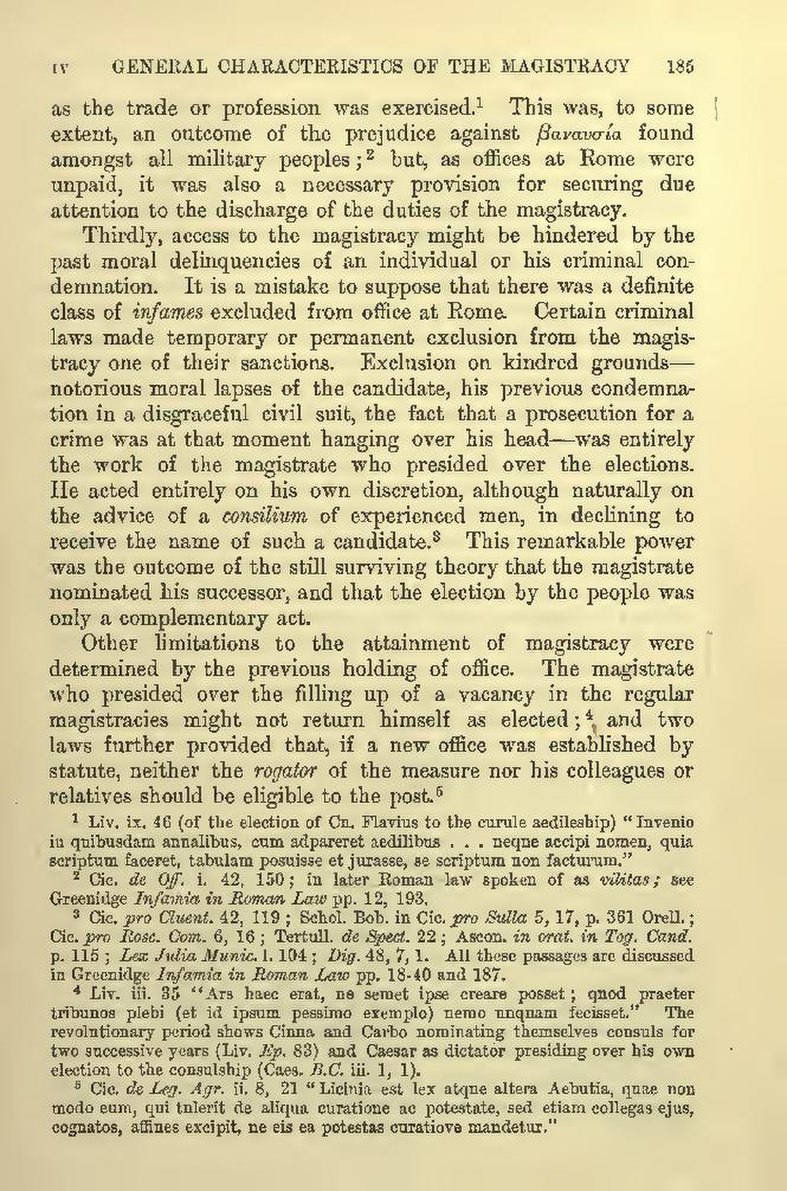as the trade or profession was exercised.[1] This was, to some extent, an outcome of the prejudice against [Greek: banausia] found amongst all military peoples;[2] but, as offices at Rome were unpaid, it was also a necessary provision for securing due attention to the discharge of the duties of the magistracy.
Thirdly, access to the magistracy might be hindered by the past moral delinquencies of an individual or his criminal condemnation. It is a mistake to suppose that there was a definite class of infames excluded from office at Rome. Certain criminal laws made temporary or permanent exclusion from the magistracy one of their sanctions. Exclusion on kindred grounds—notorious moral lapses of the candidate, his previous condemnation in a disgraceful civil suit, the fact that a prosecution for a crime was at that moment hanging over his head—was entirely the work of the magistrate who presided over the elections. He acted entirely on his own discretion, although naturally on the advice of a consilium of experienced men, in declining to receive the name of such a candidate.[3] This remarkable power was the outcome of the still surviving theory that the magistrate nominated his successor, and that the election by the people was only a complementary act.
Other limitations to the attainment of magistracy were determined by the previous holding of office. The magistrate who presided over the filling up of a vacancy in the regular magistracies might not return himself as elected;[4] and two laws further provided that, if a new office was established by statute, neither the rogator of the measure nor his colleagues or relatives should be eligible to the post.[5]
- ↑ Liv. ix. 46 (of the election of Cn. Flavius to the curule aedileship) "Invenio in quibusdam annalibus, cum adpareret aedilibus . . . neque accipi nomen, quia scriptum faceret, tabulam posuisse et jurasse, se scriptum non facturum."
- ↑ Cic. de Off. i. 42, 150; in later Roman law spoken of as vilitas; see Greenidge Infamia in Roman Law pp. 12, 193.
- ↑ Cic. pro Cluent. 42, 119; Schol. Bob. in Cic. pro Sulla 5, 17, p. 361 Orell.; Cic. pro Rosc. Com. 6, 16; Tertull. de Spect. 22; Ascon. in orat. in Tog. Cand. p. 115; Lex Julia Munic. l. 104; Dig. 48, 7, 1. All these passages are discussed in Greenidge Infamia in Roman Law pp. 18-40 and 187.
- ↑ Liv. iii. 35 "Ars haec erat, ne semet ipse creare posset; quod praeter tribunos plebi (et id ipsum pessimo exemplo) nemo unquam fecisset." The revolutionary period shows Cinna and Carbo nominating themselves consuls for two successive years (Liv. Ep. 83) and Caesar as dictator presiding over his own election to the consulship (Caes. B.C. iii. 1, 1).
- ↑ Cic. de Leg. Agr. ii. 8, 21 "Licinia est lex atque altera Aebutia, quae non modo eum, qui tulerit de aliqua curatione ac potestate, sed etiam collegas ejus, cognatos, affines excipit, ne eis ea potestas curatiove mandetur."
